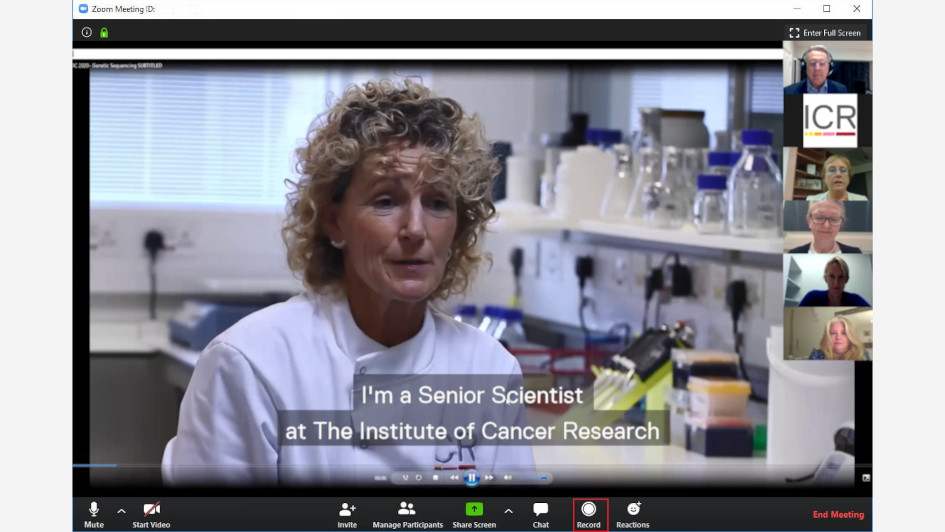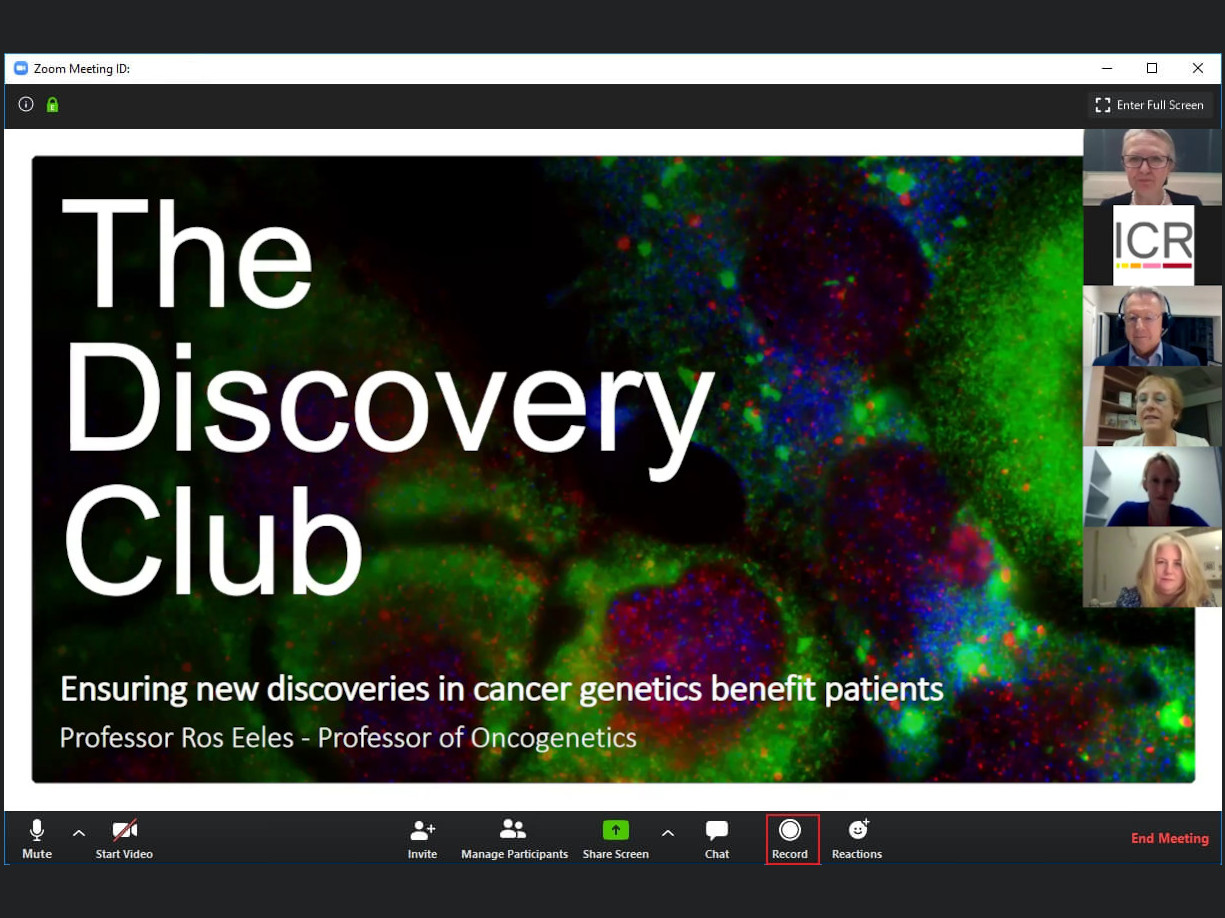
Image: Dr Zsofia Kote-Jorai, who is a Senior Staff Scientist in Profesor Ros Eeles' lab explains to the Discovery Club how they perform genetic sequencing on tumour samples from men with prostate cancer
Members of the ICR’s Discovery Club were given an exclusive insight into how researchers sample, process and analyse tumour cells in the lab, as part of the ICR’s first virtual event for our donors.
Professor Ros Eeles, who leads the ICR’s Oncogenetics Team and is a world-leading expert in the genetics of prostate cancer, explained during a video event how she and her team analyse the DNA from thousands of men with and without prostate cancer to find genetic clues about the disease.
The ICR's Discovery Club offers a regular series of events for our donors to hear from some of our leading scientists and clinicians about their work. The event took place online for the first time instead of in person due to the coronavirus pandemic.
A video featuring members of Professor Eeles’ team showed how they are continuing their important work and making progress in studying cancer genetics despite the impact of coronavirus on research.
Learning about genetics and prostate cancer risk
The virtual event was a chance for ICR researchers to share examples of cutting-edge research into the genetic causes of cancer with Discovery Club members from the comfort of their own home.
Professor Eeles explained that there are three billion letters that make up the human genome, our entire DNA structure in every cell, which was first read by scientists nearly 20 years ago.
This medical revolution means scientists can now identify genetic markers in our DNA linked to diseases like prostate cancer – heralding a new era of personalised healthcare.
Finding the genetic markers for prostate cancer is important because many men will never develop aggressive disease, so genetic screening can prevent unnecessary biopsies and scans in those that are likely to stay healthy, and pick up the disease sooner in men who need urgent treatment.
Discovery Club members watched a video showing Professor Eeles’ team preparing tumour samples in the lab, and explaining the steps needed to read their DNA.
This incredibly complex task requires sophisticated equipment and know-how, but ICR scientists are making great strides in uncovering genetic risk markers for prostate cancer.
Professor Ros Eeles has been has been instrumental in ensuring new discoveries in cancer genetics, immediately benefit patients. Learn about the work of Professor Eeles and the Oncogenetics Team.
Identifying those most at risk of prostate cancer
By comparing tiny changes across thousands of DNA sequences, scientists can pick out common variations in men that indicate an increased risk of prostate cancer.
Researchers like Professor Eeles and her team have identified 256 changes in DNA which increase the risk of men developing the disease, accounting for nearly half of all the inherited genetic risks for prostate cancer.
Professor Eeles is also identifying rare mutations that can lead to the most aggressive forms of prostate cancer.
Her team has found that men with BRCA2 mutations, a genetic fault also linked with breast cancer in women, were much more likely to develop prostate cancer than men without the mutation.
Professor Eeles is leading clinical trials looking into whether regular DNA screening of men with mutations like BRCA2, could help diagnose prostate cancer earlier.
DNA screening could also give men more insight into their own health, helping them make decisions that could influence not only their cancer diagnosis, but their treatment too – and which ultimately, could help them live longer and better lives.
We've lost many vital research hours to the coronavirus crisis but the need for our work continues to grow. Please help us kick-start our research to make up for lost time in discovering smarter, kinder and more effective cancer treatments, and to ensure cancer patients don't get left behind.
Even greater need for cancer treatments and interventions
ICR Chief Executive Professor Paul Workman said: “It was great to hear from Professor Eeles today, whose research into cancer genetics is truly world leading. Her work is helping us to identify those people who have increased risk of prostate cancer, in order that we can detect and treat the disease sooner, and even potentially prevent men from developing prostate cancer in the first place. We know that cancer has not been self-isolating during this time, and we continue to publish major discoveries that will help us to make the discoveries that defeat cancer.
“There is going to be an even greater need for cancer treatments and interventions as a result of Covid-19, and the support of our donors and their messages of encouragement is absolutely vital and appreciated. I can’t thank you enough for your continued help and commitment to support us through these difficult times.”
Why your support is so important
The Discovery Club is our high-value giving club whose members help us to drive forward our scientific strategy through philanthropic investment in key organisational priorities.
The events are an opportunity for members to hear from leading ICR scientists and clinicians about their work, and the ways that their support is making a difference.
It takes multidisciplinary teams of researchers and sophisticated data analysis to uncover the genetic causes of cancer, and we couldn’t do it without your generous donations.
Your continued support helps push forward our vital research, ensuring that new discoveries in cancer genetics are brought rapidly into the clinic to benefit patients. If you would like to find out more, please contact Hannah Joyce, Deputy Director of Philanthropy.
